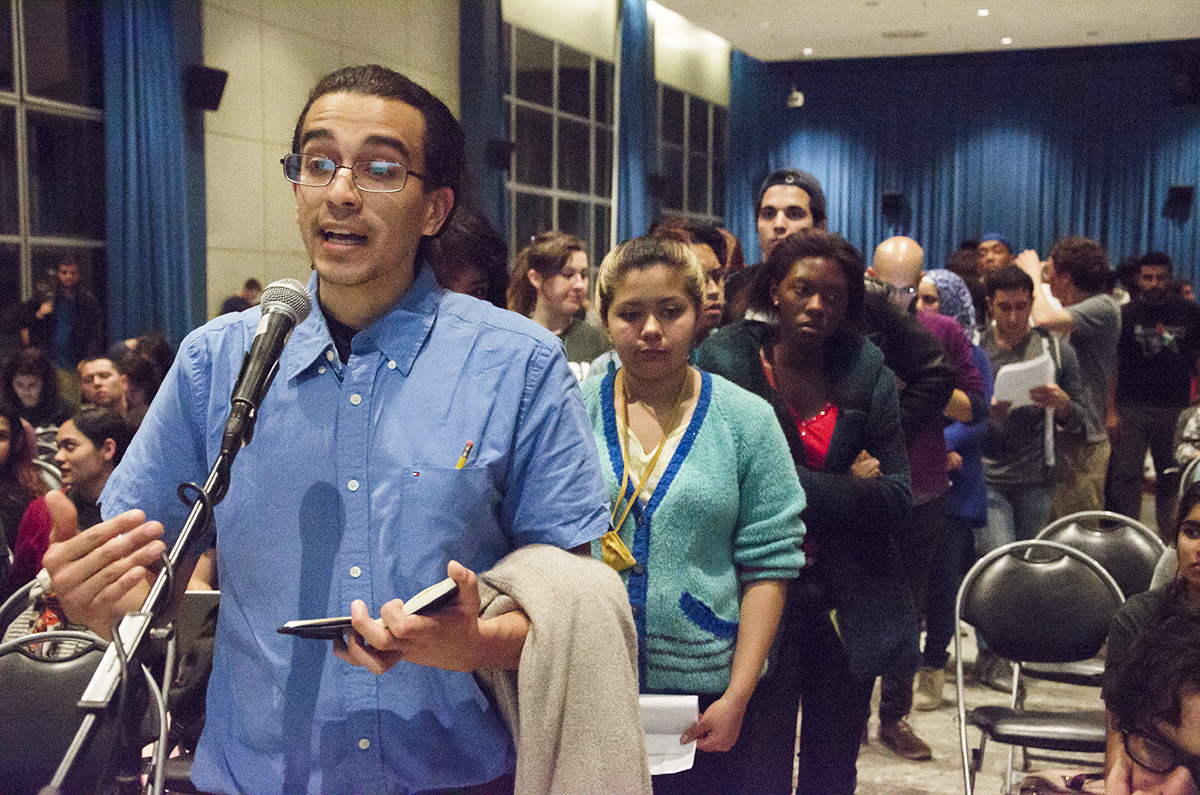Aram Ghoogasian: USAC must vote ‘yes’ on divestment, consider consequences of inaction

Michael Reyes, then a fourth-year English student, was one of many students who spoke in last year’s Undergraduate Students Association Council meeting to express his support for the divestment resolution. Hundreds of students spent hours advocating for and against the resolution. (Daily Bruin file photo)
By Aram Ghoogasian
Nov. 17, 2014 1:47 a.m.
Hundreds of students stood in two rows to voice their opinions on divestment until close to dawn at a student government meeting last February.
Now our student government is gearing up for round two. This time the meeting will probably be over before the sun rises Wednesday morning, but tensions will still run high.
At the end of Tuesday’s meeting, the Undergraduate Students Association Council should vote “yes” on the second resolution to divest from “companies engaged in violence against Palestinians” since last winter.
The council won’t be voting on the Israeli-Palestinian conflict or trying to find the solution to one of the world’s most intensely debated geopolitical conflicts: They are voting on a document that calls on the University of California to withdraw some of its unethical investments.
The UC currently invests in companies that do business in the occupied Palestinian territories and profit from selling equipment such as helicopters and missiles to the Israeli government. This equipment is then used in ways that harm Palestinian civilians. For instance, Caterpillar bulldozers are used to demolish Palestinian homes during land grabs like the one in the West Bank over the summer.
The most frequently used arguments made against this bill have nothing to do with its ethical implications, or really even with its text or meaning. Many of the resolution’s critics contend that this issue does not fall under USAC’s purview as a student governing body. They argue that USAC should remain neutral on global geopolitical conflicts that threaten to disrupt campus climate and divide communities.
But the problem with this argument is that choosing to staying quiet about the issue of divestment is not a neutral stance.
The decision to invest our student fees in these companies in the first place was not a neutral one; providing finances to corporations that enable human rights violations is making a statement and taking a side. In reality, divesting, and therefore withdrawing support from either side of the conflict, would be the closest thing to true neutrality on the matter of Israel-Palestine.
Many students, most notably members of the Jewish community, have also taken issue with the resolution’s ties to the Boycott, Divestment and Sanctions (BDS) movement, which they say is anti-Semitic and denies Israel’s right to self-determination. One of the movement’s founders, Omar Barghouti, is often accused by the resolution’s detractors of anti-Semitism and anti-Zionism.
But accusations of anti-Semitism against Barghouti do not delegitimize BDS’s tactics or all the movement’s participants. Boycotts, divestment and sanctions are all nonviolent forms of achieving political change that have been historically effective.
Furthermore, students should recognize that USAC is only voting on the language of this specific resolution, not on BDS as a movement. Nowhere in the language of the resolution is USAC called upon to endorse a boycott of Israel; in fact, the word “boycott” does not appear once. The resolution is solely concerned with the UC’s divestment from a number of American corporations, and should not be perceived as an attack on another country.
And it’s not like the UC has had qualms about undoing irresponsible investments in the past. The UC made an ethical choice to divest from tobacco and gun manufacturers in recent years.
In 2006, the UC divested from companies that did business in Sudan as a partial result of student action in the face of the genocide in Darfur. Previously, it divested from companies doing business in apartheid South Africa.
The principles behind this resolution are similar to those that guided preceding divestment decisions, but it has been stalled by the divisive nature of this specific conflict on our campus. Human rights were violated in Sudan, South Africa and in Israel-Palestine, regardless of the difference in scale. The UC addressed its involvement in violence in other countries and should do the same for Israel-Palestine.
Another argument against the resolution is that it will have little to no practical effect: The UC Regents have said that they will not divest from companies doing business in Israel. But a student government resolution is one of the only things that could potentially pressure the regents to change their investment policies, even if such an outcome is unlikely. And even if divestment doesn’t cause the targeted companies to lose substantial profits, it would at the very least remove the UC’s complicity in human rights violations. That alone is enough for students to fight for.
However, there are still the immediate consequences of voting on such a heated topic. Some students are worried that passing the resolution could have a negative effect on the campus climate. But as we saw last year, it doesn’t matter how councilmembers vote – someone will always take issue with their decision. Divisive decisions shouldn’t be shied away from because of potential disagreements. That’s just the nature of decision-making and leadership.
The problems posed by these investments may seem distant from our campus – about 7,500 miles away to be more precise. But the fact of the matter is that USAC is funded by our student fees, just as the UC gets a good deal of its money, either directly or indirectly, from those same fees. This money, our money, is being invested irresponsibly. Students have a stake in voicing their opinions about how our money should be used.
The first step in ending our complicity is the resolution’s passage, and USAC should acknowledge that reality. The relationship between ethics and investments often gets complex, but USAC’s decision shouldn’t be.


